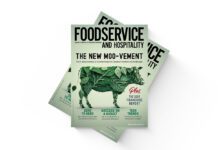
By Davide Del Brocco, CSR senior Sustainability manager, Sodexo Canada
More Canadians are considering new ways of eating sustainably that extend our wallets, improve our health and reduce our environmental impact. Shifting to a plant-forward diet is a powerful way to do all three.
According to Sodexo Canada’s first Sustainable Food Barometer conducted by Leger, nearly nine in 10 Canadians recognize the urgency of adopting a sustainable lifestyle.
With the global food system alone responsible for 27 per cent of greenhouse gasses (GHG), shifting to a low-meat diet could result in substantial reductions in emissions and help address chronic illnesses influenced by traditional dietary patterns, according to World Wildlife Fund (WWF) Canada.
Increasingly, Canadians are expressing a willingness to reduce their meat and dairy consumption, indicating a growing openness to plant-based choices. Despite this growth in awareness, there are still many myths surrounding plant-based diets that prevent more people and businesses from adopting them.
A common misconception about plant-based diets is that they’re expensive. Some plant-based products may cost more than their animal-based alternatives, but most are on the lower end of the grocery bill. A shift in awareness about the affordability of plant-based proteins such as beans and lentils can be a game-changer. By cutting an expensive meat component, the savings for individuals and businesses are clear.
Gradually incorporating more plant-based meals into our diets can help with the transition. Even minor changes, such as including a few plant-based meals per week with vegetables and whole grains, can make a significant difference to health and budget.
After price, 72 per cent of Canadians prioritize taste when deciding what to purchase. Luckily, adopting a plant-based diet doesn’t mean compromising on familiar, comforting flavours.
The notion that plant-based eating is confined to salads is debunked as plant-based cuisine extends far beyond, offering savoury meat alternatives and culturally diverse flavours that cater to a wide audience. Given the extensive variety of fruits, vegetables, grains, legumes and spices available, the possibilities for creating delicious plant-based meals are endless.
Overall, some meat consumption isn’t necessarily a problem. Health and environmental issues lie in the amount we consume. Shockingly, half the global population consumes 50-per-cent more protein than necessary, according to a report from World Resources Institute.
Gradual changes, such as going meatless on specific days or reducing dairy intake, can yield notable health benefits. Diets rich in plant-based foods can help protect against heart disease, type-2 diabetes, hypertension, specific cancers and support immunity. Instead of an all-or-nothing approach, we can focus on sustainable changes that align with individual businesses and lifestyles.
One meal at a time, Canadians can aim for a plant-centric diet focused on vegetables, whole grains, plant proteins and fruits. Small, gradual changes will make adopting a plant-forward lifestyle more accessible and contribute not only to our well-being but to a more sustainable and environmentally friendly future.




















